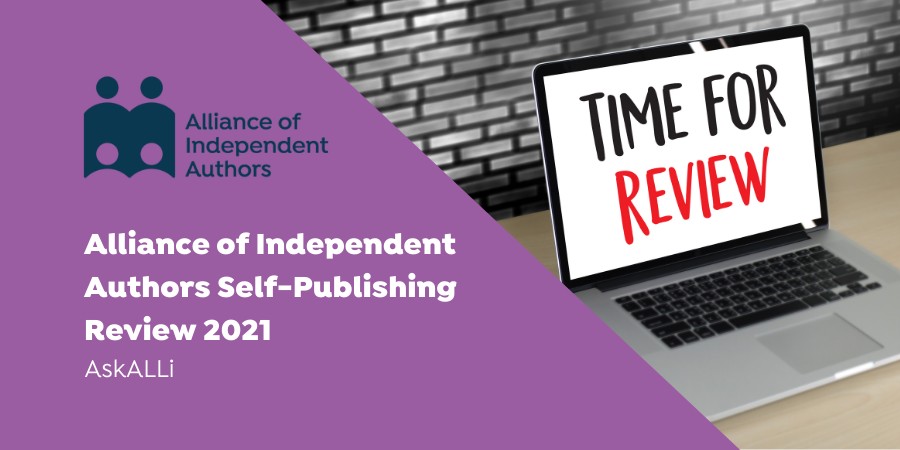Each December, Alliance of Independent Authors (ALLi) director Orna Ross looks back at the year and reviews what happened over the previous twelve months in the publishing industry and the self-publishing sector, while the ALLi team–all indie authors themselves–report on their personal experiences. This is ALLi's Self-publishing Review 2021, with thanks to: International Publishers Association – Data and statistics, International publishing news at Publishing Perspectives Magazine, Jane Friedman, Joanna Penn and Business Intelligence for Career Authors, UNESCO book production statistics and Written World Media and Dan Holloway's weekly Self-Publishing News column and podcast

Orna Ross, Director of ALLi
Year on year, many things in our industry stay the same. The need to produce quality books, for example, will never change but each year brings its specific changes and challenges. 2021 was a gruelling year for some, a great year for others, and a rollercoaster year for many, as the pace of change continued to pick up, against a background of Covid-based restrictions and global lockdowns.
Despite the challenges, it has been a good year for many indie authors. In most territories, book sales soared in 2021 as they had in 2020, with all formats, especially digital–ebooks, audiobook downloads and print-on-demand (POD) print–posting solid gains globally.
While statistics for the full year are not yet available, BusinessWire estimates that the global book market grew from $87.92 billion in 2020 to $92.68 billion in 2021 and GrandView Research predicts that this will reach $124.2 billion by 2025.
We are in a growth industry!
Most gratifyingly, young people are reading more. Juvenile fiction is up 11% and juvenile nonfiction 23.1%, while sales of young adult (YA) fiction and nonfiction are runaway, up 38.3% and 21.4%. This trend points to growth being driven by more readers coming into the market, discovering the joy of books, as well as current readers reading more.
Indie authors found themselves well placed to meet this demand in 2021. Let's take a closer look.
Self-Publishing Review 2021: Publishing Industry Overview
In 2021, the biggest worldwide players in trade publishing included the China South Publishing and Media Group, Grupo Planeta, Bertelsmann, Pearson PLC, and Hachette Livre. Asia and North America were the leaders in book production, with both holding a 34% share of the publishing industry.
Consolidation continued in trade publishing. Dan Holloway, ALLi's News Editor reported on the move to stop a $2.2bn acquisition of Simon and Schuster by Bertelsmann, owners of Penguin Random House, which would see the global publishing landscape reduced to a Big Five . The US Justice Department has stepped in, stating that less competition means a less robust mechanism for ensuring authors get paid fairly. Bertelsmann makes the counter-claim that merging gives them a stronger negotiating position with Amazon.
The pandemic, and carry-over trends from the past, have created ongoing supply chain issues in most physical wholesale and retail businesses, and the publishing industry is no exception. Years of widespread closures left printers and paper manufacturers ill-prepared to cope with the surge in book sales from Covid-19 outbreak.
The publishing industry had already been facing trends that the pandemic accelerated. Direct access to bookstores was the last advantage for trade publishers over indie authors, but in 2021 those already-struggling physical bookstores continue to suffer from lockdowns. More book buyers grew increasingly comfortable shopping online and reading digital books (ebooks, print-on-demand and audiobook downloads).
Readers and writers alike have become accustomed to online book launches and events and we saw also saw an increase in authors selling directly to readers, from their own websites and on blockchains.
Statista, through their amazing Worldometers website, tells us that 2021 saw 2.2 million new book titles published globally this year (2539 so far today, at time of checking!). Their source is UNESCO (See a country-by-country breakdown here) and Bowker, which means many self-published titles are not included in their recordsm.
We need research to establish the size of this trend and indeed the size of the self-publishing book market by sales volume. Nobody knows how many books are self-published, which self-published books are selling best and how many readers love to buy directly from authors. We can see these trends growing, but we don't have hard data. ALLi hopes to amass some in 2022.
Self-Publishing Review 2021: Print Books
For those publishing print books, the biggest story of the year was the paper supply-chain problems and pricing.
In the US, at the beginning of the year NPD BookScan reported that unit sales of print books had hit an all-time high, with POD and the pandemic together stopping years of decline. But paper and labor shortages, and delays in getting books from Chinese and Asian printers into the U.S., UK and Europe, owing to congestion at ports, slowed this growth. And the POD industry was also affected.
The publishing industry has seen several cost increases for consumables, such as paper and packaging materials, as well as an increase in the cost of labor. Operating safely during the pandemic also has required additional resources and investments in manufacturing and distribution centers.
On November 6th, 2021, IngramSpark increased its print pricing by 6% in the US market and 3% in the UK & Australian markets.
Self-Publishing Review 2021: Audiobooks
Audiobook popularity kept rising (from a low base) and the two big audio stories this year were acquisitions. Stockholm based Storytel bought Audiobooks.com for an enterprise value of US$135 million and Spotify announced it is to spend an undisclosed amount of money to acquire Findaway, the indie author's favorite audiobook distribution platform.
Spotify aims to be the leader in the listening market, including podcasts and books as well as music, and is expected to surpass Apple as the lead podcast platform by January next.
Amazon’s Audible.com remains too dominant in audiobooks, even though its one-credit-per-month subscription model seems clumsy in comparison to Storytel's sleek, stream-all-you-like, model.
Indie author Susan May, and her valiant band of audiobook author campaigners, put real money in author pockets in 2021, with concessions won from Audible. Audible's mistreatment of indie authors continues, as we are forced to pay for returns that are not returns but market exchanges, for seven days–alongside other issues. The campaign continues–see the Audiblegate campaign for more information.
The other big audio story this year was AI narration, which drops the time needed to produce an audio edition of a book from days to minutes. Audible, Findaway or other distribution platforms do not yet accept AI narrated books but authors have begun to produce them for direct sales.
Finally, late in the year audiobook platform Podium announced it is expanding into ebook publishing.
Self-Publishing Review 2021: Tech and Tools
AI in self-publishing
NFTs and Blockchains
In 2021 everyone was talking about projects given the least catchy name of all time: non-fungible tokens, (NFTs), essentially digital packages traded on blockchains, ideally for premium prices.
Historically, piracy has plagued digital format but as blockchain’s matures and enables scarcity in digital markets, demand is surging for unique pieces and collaborations, ushering in a fresh wave of creativity and collaboration. Authors have been slower than musicians and artists to take their place in this creative landscape but in 2021 that changed.
Self-Publishing Review 2021: Creator Economy
NFTs are actually part of a wider trend, whereby tech and social media giants aspire to become creator companies. Today, over 2 million creators make six figures or more on YouTube, Twitch, and Instagram. Sponsored influencers are worth over $8 billion and this is expected to grow to $15 billion by 2022.
Platforms like Twitch, Patreon, and Cameo has enabled creative people with followings to monetize like never before.
In 2021,
- Apple and Spotify allowed podcasters to charge for their podcasts or for premium content.
- Twitter introduced a tip jar and paid tweets.
- Medium and Substack saw steep rises in author income from reader subscription payments.
And selling books on social media platforms became easier, with improved Facebook and Instagram stores, product tagging and other features.
Mark Zuckerberg recently told investors that he wants Facebook to be known as a “metaverse” company, essentially an online world where people exist as avatars in shared digital spaces, monetised through commerce and advertising.
The creator economy has so far proved easier for non-fiction publishers, though novelists are looking for a way to use platforms like Substack to monetize fiction and 2021 also saw the launch of a new app promising to be “the patreon of fiction”, Litty.co.
While this was the year that this trend took off, the creator economy still very much in its infancy. In Harvard Business Review, Li Jin argued that the creator economy needs to develop a middle class: right now, a handful of top creators are succeeding with the majority failing to get started, never mind make an impact. So far, the creator economy is as unbalanced as traditional publishing and other arts and entertainment sectors.
On the other side of the creator coin, indie authors began to be charged for coverage by influential social media book reviewers who used to work for “free” books (that would take them hours to read and review). BookTokers and Bookstagrammers and their colleagues on other platforms became increasingly aware of their value to publishers, which of course includes author-publishers, in 2021.
Self-Publishing Review 2021: Other Trends
Cross Promotion
Cross-promotional strategies are becoming more important as a way for indie authors to reach a wider audience. Whether it’s books published alongside films and documentaries, books published to promote a business, books published to boost speaking events, or cross-promotion with books from other authors, this marketing approach is an increasingly appealing way to reach a wider audience.
Diversity and Inclusivity
This year was also saw calls for greater diversity in publishing and the recognition that self-publishing is serving this trend. Not just diverse authors, but books and characters themselves reflecting a real world of many representative voices. Authors from the BIPOC, LGBTQ+, neuro-divergent, and disabled communities of all kinds are telling their own stories, from their own perspectives, as never before.
Self-Publishing Review 2021: ALLi Team
Debbie Young, ALLi Special Projects & UK Ambassador

ALLi Special Projects & UK Ambassador Debbie Young
“In the last few months, more and more indie authors have been telling me they are weary of the pay-to-play rollercoaster of certain publishing platforms. I know quite a few who are recalibrating to focus on quality rather than quantity. Particularly after the battering our mental well-being has taken from the Covid pandemic, stepping back from marketing pressures, while maintaining an effective author platform (website, social media, etc), can feel like a much-needed healing process.
This may not be an option if your chosen business model relies on rapid release and you are dependent on your writing income to pay your mortgage, but you could always switch business models to avoid burnout. Authors should ask themselves whether they might earn additional income streams from teaching or editing or commercial copywriting to buy more writing time. Even using affiliate codes more widely eg ALLi's member-get-member scheme, can make a significant difference to your overall profitability.
Meanwhile if you're a certain age and your mortgage is paid and you are writing in retirement, what may be uppermost in your mind is whether you're going to have time to write all the stories in your head before you die. That can make it hard to tear yourself away from writing to numbercrunch ads, populate social media accounts etc. As to myself, I made a conscious decision this summer that whenever I start a new project, I'll write whatever is in my heart, rather than necessarily what makes the most commercial sense. I took time out to write a standalone novella when I was overdue to write the third in a series of mystery novels. But I'm really glad I did it, and I will continue to take this approach for the foreseeable future. It feels controversial or even heretical as a successful indie author to be saying this, but I have a feeling that a significant number of authors out there when they read this will be thinking, “Oh please, yes, let me just write for a while! In 2022, I just want to write!”
Howard Lovy ALLi News and Podcast Producer

ALLi News and Podcast Producer, Howard Lovy
“This past year, I continued to be inspired by the indie authors I've interviewed on my podcast and I am thankful to ALLi for pairing me with the brilliant Dan Holloway in our Self-Publishing News program.
Outside my ALLi work in 2021, I continued to contribute to the indie-publishing ecosystem as a book editor and writing coach. I've seen a huge increase in clients working on their memoirs, most of whom choose the self-publishing option. I must be doing something right because I've garnered excellent reviews on Reedsy. I've edited memoirs from a range of authors, including a Broadway star, a heroin addict, a former prisoner, a Holocaust survivor, and many others.
We all know what it's like to go through some incredibly hard times. I'm able to use my own backstory to help other authors find their voice and some healing. I approach the work without judgment and with lots of empathy. I am also happy to introduce these authors to ALLi, and many have found a home in this organization.
As for what 2022 will bring, I try not to predict the future. I am thankful to be doing what I love and I hope to contribute even more to ALLi. My next stop will be the London Book Fair in April, where I will finally meet my British colleagues!”
Roz Morris, ALLi Magazine Editor

Roz Morris, ALLi Magazine Editor
“This year I published my third novel, Ever Rest. It’s been in the works for seven years, a painstaking but rewarding labour. I’ve had great reviews, so I’ve achieved what I set out to do. At each stage of the writing, production and launch, I’ve been hugely grateful for the tools and resources that made it possible for me to bring it to readers, and the ALLi people who share their expertise and experience so I could. But I might be an endangered species in the indie author world.
I edit the ALLi magazine (The Indie Author, known affectionately as TIA), and so I see the full scope of members’ activities. In 2021 I’ve seen a notable split. As the sales platforms increasingly become pay-to-play, this favours a particular type of author – those who produce frequently in commercial genres. That does not suit everybody.
In 2022, let’s not forget that authors who write slowly in non-commercial genres can still produce great work that pleases readers and critics. ALLi is an inclusive organisation. We should welcome diversity in publishing priorities as well as in other matters. We should help those authors thrive too, not just those who are suited to the commercial game. I’d particularly like to see ALLi call for competitions that judge books by literary merit and originality, and not their popularity or sales figures.”
To access the ALLi Magazine, log into the member portal here. Navigate to PUBLICATIONS >MEMBER MAGAZINE

Michael LaRonn, Author and ALLi Outreach Manager
Michael LaRonn Member Q&A Podcast Co-Host and Outreach Manager
“2021 was as close to a “normal” year as we could get. It was a sales record for me, and I’m grateful for that. The biggest impact to my business was implementing new ways of automating routine tasks so I can spend more time doing the things that create value for my readers. On the AskALLi Member Q&A, I was impressed with how many questions we received around copyright and rights licensing. It’s great to see so many of our members thinking about these critical issues.”
Tim Lewis, Twitter Chat Ambassador

Tim Lewis, ALLi Author Member and Twitter chat host
“The start of 2021 was really tough. After missing a family Christmas because of the government locking down it was tough getting through the first few months of the year. One good point was that the #indieAuthorChat Twitter chat that I run for ALLi was building up a strong community of people and really had some great discussions on a variety of topics. The chat has transitioned from a guest being the norm to having more a talking point as the usual chat subject. In terms of writing I haven't done much, though I am gradually planning a non-fiction book for 2022. Later on in the year I have been working on an Amazon Live show, Book Chat Live, where I interview people about their favourite books. So 2021 hopefully is ending on a much more positive note than it started!”

Sacha Black, ALLi Blog Editor
ALLi Blog Manager, Sacha Black
“This was a strange year for me, it felt transitional in terms of business and mindset. After the horrors of 2020, I really wanted to make sure this was a year where I righted things. I spent most of the back half of this year closing down projects I'd opened, unfinished books and courses, promises I'd made and things I'd committed to. Next year I'm starting with a clean slate so I can focus more on wording and finishing books than anything else. In terms of mindset shifts, the pandemic and this year especially showed me that not only can I survive, but I can thrive too. I'm seeing new ways to make money, new income streams and viewing my business in a different way. The strange thing for me is that I left my day job and a year later the pandemic hit, so although I'm approaching the end of my third year working for myself full-time, I feel very much like I've been in survival mode for much longer than I would have been had the pandemic not happened. I hope that next year that won't be the case.”
Self-Publishing Review 2021: References and useful resources
- The UNESCO book production statistics
- International Publishers Association – Data and statistics
- Written World Media State of Indie Authorship reports
- Porter Anderson's international publishing news at Publishing Perspectives Magazine
- Jane Friedman's The Hot Sheet Business Intelligence for Career Authors
- Our own wonderful Dan Holloway's weekly Self-Publishing News column and podcast




